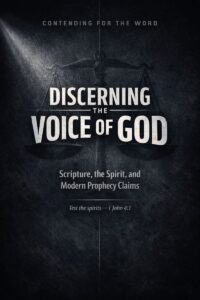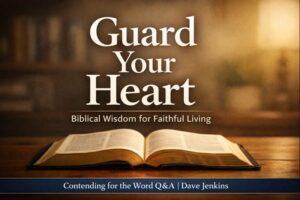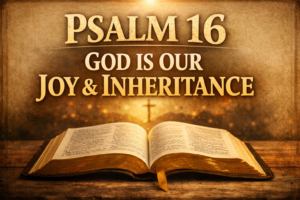⏱️ Estimated Reading Time: 8 min read
God Without Rivals: Rejecting Divine Council Theology
Question
What is the divine council of God, and why should Christians reject Michael Heiser’s view of it?
Answer
Michael Heiser’s teaching on the so-called “divine council” has sparked widespread interest—especially through his book The Unseen Realm. Heiser argues that certain passages in Scripture reveal a heavenly council of spiritual beings—lesser elohim—who serve under Yahweh’s authority. He frequently cites Psalm 82, Deuteronomy 32:8–9, and Job 1 to support this view.
“The term divine council is used by Hebrew and Semitic scholars to refer to the heavenly host, the pantheon of divine beings who administer the affairs of the cosmos.”[1]
“The Old Testament writers understood that Yahweh was an elohim—but no other elohim was Yahweh. He was species-unique among all residents of the spiritual world.”[2]
While Heiser’s proposal is complex and provocative, it ultimately challenges the clear, consistent witness of Scripture and the Church about the nature of God and His supremacy.
What Psalm 82 Actually Teaches
Psalm 82:1 says,
“God has taken his place in the divine council; in the midst of the gods he holds judgment.”
Heiser interprets “gods” (elohim) to mean real spiritual beings.
“The meaning of the verse is inescapable: the singular elohim of Israel presides over an assembly of elohim.”[3]
“God’s divine council is an assembly in the heavens, not on earth. The language is unmistakable. This is precisely what we’d expect if we understand the elohim to be divine beings. It is utter nonsense if we think of them as humans.”[2]
But we need to read this passage in full. Verses 2–4 describe these “gods” as failing to administer justice:
“How long will you judge unjustly and show partiality to the wicked? Give justice to the weak and the fatherless…”
Then comes the final blow in verse 7:
“Nevertheless, like men you shall die, and fall like any prince.”
These are human judges—rulers who have failed their calling and will be judged by God. The term elohim can sometimes refer to humans in positions of authority, as seen in Exodus 21:6 and 22:8–9. The psalm uses poetic language to describe real earthly injustice under divine scrutiny.
What About John 10?
Some say, “Didn’t Jesus affirm Heiser’s view in John 10?” Jesus quotes Psalm 82:6 when answering the Pharisees:
“Is it not written in your Law, ‘I said, you are gods’?”
But Jesus isn’t endorsing the existence of lesser divine beings. He’s making a rabbinic argument: If Scripture could apply the word gods to Israel’s judges (men), then it is not blasphemy for Him—the Son of God, consecrated by the Father—to call Himself what He truly is. This is not a defense of polytheism; it’s a brilliant rebuke of His accusers within their own interpretive framework.
The Witness of the Church and Reformed Tradition
The Church throughout history has affirmed a clear, monotheistic doctrine of God. The Reformed tradition in particular emphasizes the absolute uniqueness, simplicity, and sovereignty of Yahweh. Interpreting Psalm 82 through this lens affirms the biblical emphasis on God’s authority over human judges—not on a pantheon of lesser deities.
John Calvin: “The name gods is here applied to magistrates… because they bear the image of God.”[4]
Matthew Henry: “Earthly judges are called gods, but must die like men.”[5]
Augustine: “He called them gods, to whom he said, ‘You die like men,’ for they were men, to whom the word of God came.”[6]
Athanasius: “They are called gods because they have received power from God to judge, but they are mortal and not true gods.”[7]
Chrysostom: “He calls them gods because they have been entrusted with the office of judges. Yet they are men who shall die.”[8]
Where Heiser’s View Falls Short
1. It Undermines God’s Uniqueness
“Yahweh was an elohim, but no other elohim was Yahweh—and never was nor could be… Rather than socio-political factors, the canonical writer believed the God of Israel alone was sovereign and deserving of worship because his nature was unique (pre-existence) and his power was unquestionably superior (creator of all that is).”[9]
While Heiser insists this maintains monotheism, the very framework he builds implicitly affirms a form of divine plurality that distorts the fundamental identity of God. Scripture does not allow for a category of “lesser gods” who are real, personal, and active agents in the spiritual realm. The prophets thundered against the notion of any rival divine being. Yahweh is not merely supreme among gods—He is the only God who exists.
- “Before me no god was formed, nor shall there be any after me.” (Isaiah 43:10)
- “I am the LORD, and there is no other, besides me there is no God.” (Isaiah 45:5)
- “The LORD is God; there is no other besides him.” (Deuteronomy 4:35)
- “You shall have no other gods before me.” (Exodus 20:3)
2. It Leans Too Heavily on Ancient Near Eastern Backgrounds
“The proper context for interpreting the Bible is the context of the biblical writers — the context that produced the Bible. Every other context is alien to the biblical writers and, therefore, to the Bible. Yet there is a pervasive tendency in the believing Church to filter the Bible through creeds, confessions, and denominational preferences.”[10]
Ironically, while this quote champions the biblical writers’ context, Heiser’s interpretive method often imports meaning from outside the biblical canon—especially from pagan mythologies like Ugaritic literature. While background studies can offer insights, they should never be elevated above the plain teaching of the inspired text. The danger is not merely scholarly—it’s theological. Elevating cultural parallels over canonical clarity subtly shifts the authority from Scripture to speculation.
3. It Encourages Speculative Theology
Heiser relies on disputed manuscript variants (like the DSS rendering of Deuteronomy 32:8) and layers of hypothetical interpretation. The result is an intriguing but speculative framework that can distract believers from the clarity, authority, and sufficiency of God’s revealed Word.
We do not need cryptic codes or mythological reconstructions to understand God—we need the Word rightly handled (2 Timothy 2:15).
The Glory of the One True God
The God of the Bible is not one among many options. He is not confused, nor is He spinning the wheel of chance or luck in heaven. He is the Covenant Lord of Hosts. He is Yahweh—the Alpha and the Omega, the Prince of Peace. He has revealed Himself clearly and specifically in His Word, and supremely in the person of Jesus Christ, who is truly God and truly man.
To suggest there are other gods, multiple gods, or any need for an alternative “god” is to depart from biblical Christianity altogether. Such a belief steps outside the bounds of historic, orthodox Christianity and enters into an entirely different religion.
The God of the Bible is eternally self-sufficient and self-existing. He needs us not, and yet He made us in His image and likeness to be His and He ours.
In a time when mystery and speculation attract many, let’s hold fast to what is clear. God has not surrounded Himself with a pantheon. He has revealed Himself clearly—in Scripture, in Christ, and by the Spirit. He alone is God, and there is no other.
“To whom then will you compare me, that I should be like him? says the Holy One.” (Isaiah 40:25)
Let us reject every teaching that clouds God’s absolute uniqueness and stand firm in the truth: Our God has no rivals. He alone is worthy of worship, and His Word alone is our rule for faith and life.
For Further Study
- The Word Matters by Dave Jenkins – A resource on biblical authority and the clarity of Scripture.
- Ligonier: There Is No Other God
- Contending for the Word Q&A
References
- Michael S. Heiser, “Divine Council,” in Dictionary of the Old Testament: Wisdom, Poetry & Writings, ed. Tremper Longman III and Peter Enns (IVP Academic, 2008), p. 112.
- Michael S. Heiser, “Who Are the Elohim?” Logos Bible Software Blog, accessed July 9, 2025, https://www.logos.com/grow/who-are-elohim/.
- Ibid.
- John Calvin, Commentary on the Psalms, Vol. III (Eerdmans, 1949), p. 259.
- Matthew Henry, Commentary on the Whole Bible, Vol. 3 (Hendrickson, 1991), p. 404.
- Augustine, Expositions of the Psalms 73–98, trans. Maria Boulding (New City Press, 2003), p. 231.
- Athanasius, Against the Heathen, NPNF2-04, ed. Philip Schaff (Eerdmans, 1978), p. 4.
- Chrysostom, Homilies on the Gospel of John, Homily 63 (Eerdmans, 1983), p. 229.
- Michael S. Heiser, “Monotheism, Polytheism, Monolatry, or Henotheism? Toward an Assessment of Divine Plurality in the Hebrew Bible” (2008), Liberty University Faculty Publications, Paper 277.
- Michael S. Heiser, The Unseen Realm (Bellingham, WA: Lexham Press, 2015), p. 16.
Dave Jenkins is happily married to his wife, Sarah. He is a writer, editor, and speaker living in beautiful Southern Oregon. Dave is a lover of Christ, His people, the Church, and sound theology. He serves as the Executive Director of Servants of Grace Ministries, the Executive Editor of Theology for Life Magazine, the Host and Producer of Equipping You in Grace Podcast, and is a contributor to and producer of Contending for the Word. He is the author of The Word Explored: The Problem of Biblical Illiteracy and What To Do About It (House to House, 2021), The Word Matters: Defending Biblical Authority Against the Spirit of the Age (G3 Press, 2022), and Contentment: The Journey of a Lifetime (Theology for Life, 2024). You can find him on Facebook, Twitter, Instagram, Youtube, or read his newsletter. Dave loves to spend time with his wife, going to movies, eating at a nice restaurant, or going out for a round of golf with a good friend. He is also a voracious reader, in particular of Reformed theology, and the Puritans. You will often find him when he’s not busy with ministry reading a pile of the latest books from a wide variety of Christian publishers. Dave received his M.A.R. and M.Div through Liberty Baptist Theological Seminary.




